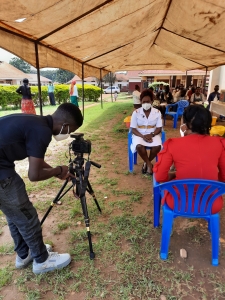How is storytelling helping health workers vaccinate people in rural Uganda?
For Rose Mary Nakame, Nursing Now Challenge Immunization Advocacy Champion and executive director for Resilient Empowerment Mechanisms for the Impoverished in East Africa (REMI East Africa), storytelling is a tool for creating connections, encouraging advocacy and shaping policy.
During the COVID-19 pandemic this approach has proven to be key for rural communities. Elevating the voices of rural health workers in Uganda and East Africa is enabling opportunities for advocacy and contributing to shaping policies that can help health workers and communities overcome the COVID-19 pandemic.
“We generally apply storytelling as a thermometer for the health system — the rural health system mainly — and we use the themes to then tell us how to strengthen the health system and how to respond.”
Nakame explains this process is part of a larger project called the Storytelling for COVID-19 Vaccine Equity and Acceptance. Rural and hard-to-reach areas in Uganda experience vaccine inequity driven by social determinants of health or factors that can affect people’s health, quality of life and livelihoods or put them at risk. The project aims to support nurses and midwives as they advocate for people to get access to vaccines and become informed about the benefits of getting vaccinated.
“Storytelling is helping to create connections with the community and raise awareness about the challenges health workers are facing or noticing within the health systems that are barriers or successes towards vaccine equity,” she said.
Health workers in rural communities receive training on how to tell their stories. The stories are then collected and published online after being adapted for the public. Videos are beginning to be produced as well. The hope is to create a documentary with additional resources that can be broadcast on local TV and radio stations to raise awareness of immunization and help people get vaccinated.
Storytelling is also helping build trust by increasing the number of people seeking public health services.

“We curate the stories to the public to generate discourse and build trust, and we identify emerging themes and galvanize them for advocacy,”
The stories help amplify the voices of midwives and nurses, informing policy, budgeting and programming and helping mobilize resources to address the concerns of the health workers.
“It is supposed to also be a tool of advocacy to communicate to those in power to act,” Nakame said, adding that storytelling could be used to a greater extent but more funding is needed to support the collection and dissemination of the stories by health workers.
The voices and stories of rural health workers like those working with Nakame have created tangible change in policy and support for midwives and nurses as they work to protect their communities and increase vaccine acceptance and equity. Recent outcomes of this project include raising funds to help acquire one thousand personal protective equipment (PPE) shields donated to the Gulu Hospital in Uganda. These supplies are being used to support the COVID-19 response locally.
Nakame said, “Rural health workers serve most of the poorest population. Therefore to attain equity – be it health equity in general or vaccine equity – we need to listen to them more.”
Immunisation Advocacy Champions like Rose Mary Nakame advocate for vaccination in their communities. The program is led by Nursing Now Challenge with support from Sabin Vaccine Institute’s Immunization Advocates.




